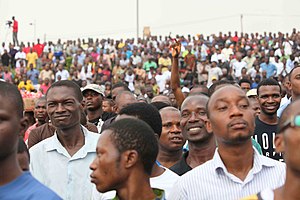| Occupy Nigeria | |
|---|---|
 Protesters at Ojota, Lagos | |
| Date | 2 January 2012 – 14 January 2012 (1 week and 5 days) |
| Location | |
| Caused by |
|
| Goals |
|
| Methods | |
| Casualties | |
| Death(s) | 16 (Lagos, Maiduguri, Ilorin and Gusau; All shot by the Nigeria Police Force)[1][2][3] |

Occupy Nigeria was a socio-political protest movement that began in Nigeria on Monday, 2 January 2012 in response to the fuel subsidy removal by the Federal Government of President Goodluck Jonathan on Sunday, 1 January 2012.[4] Protests took place across the country, including in the cities of Kano, Surulere, Ojota ( -part of metropolitan Lagos ), Abuja, Minna, and at the Nigerian High Commission in London. The protests have been characterised by civil disobedience, civil resistance, strike actions, demonstrations and online activism. The use of social media services such as Twitter and Facebook was a prominent feature of the protests. Post Occupy Nigeria and 2015, the Nigerian Government under the new president, Muhammadu Buhari have increased fuel prices from N87 to N145 with little resistant possibly due to the fact that Nigerians are beginning to realize that fuel subsidies are actually inimical to the country's growth rather than a mechanism towards helping the poor.
- ^ "Protesters killed in Occupy Nigeria uprising".at IndyMedia, 11 January 2011
- ^ "Protesters killed by Police in Occupy Nigeria at Ogba".at Sturvs, 11 January 2011
- ^ "Protesters killed in Occupy Nigeria uprising". 10 January 2012.at VOANews, 11 January 2011
- ^ Mark, Monica (8 January 2012). "Nigeria faces mass strike and protests over discontinued state fuel subsidy". The Guardian. ISSN 0261-3077. Retrieved 27 May 2020.